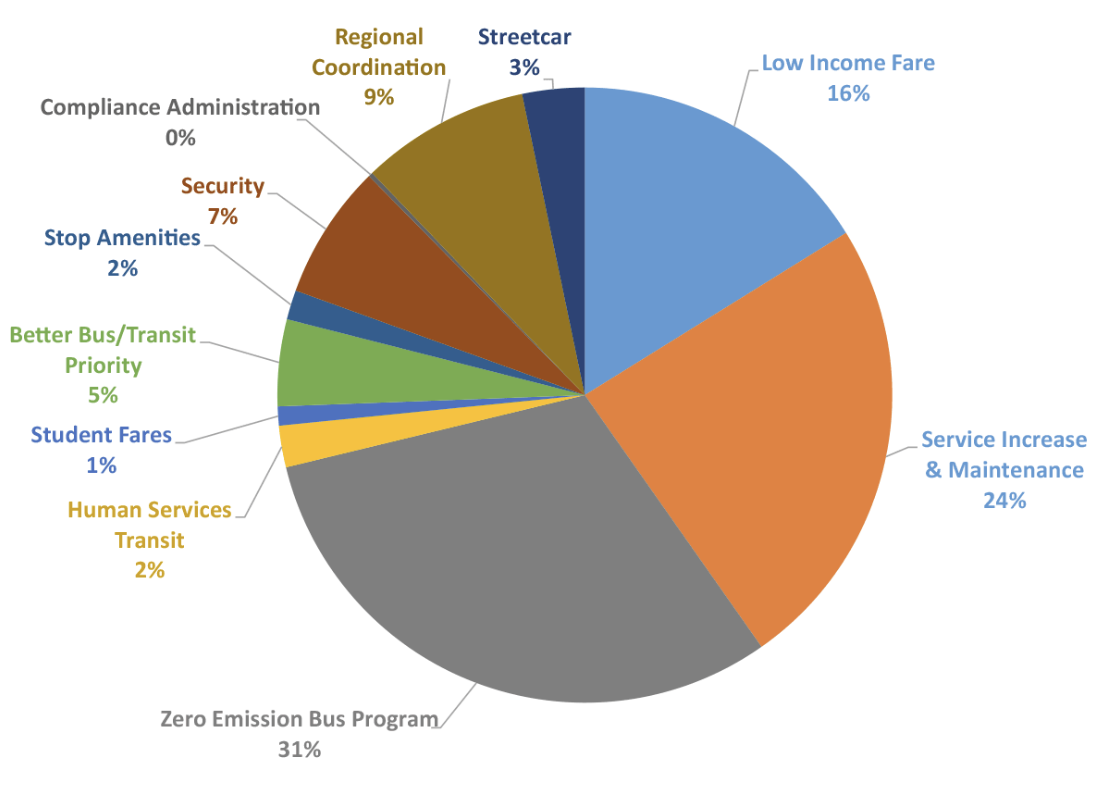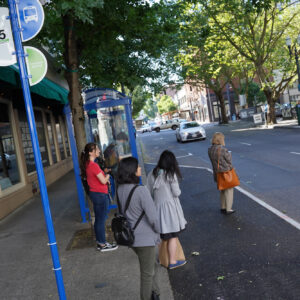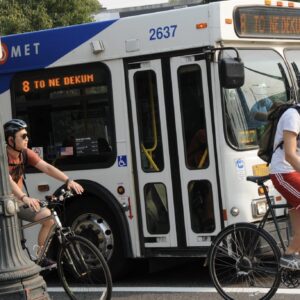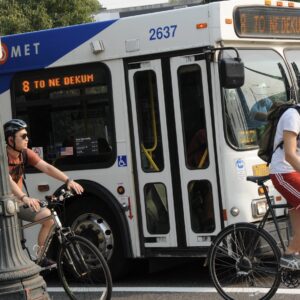TriMet, Portland’s regional transit agency, has plans for how to spend funds from the Statewide Transportation Improvement Fund (STIF) in the fiscal years 2024-2025. Now the agency wants your input on how they should use it.
This funding amounts to about $183 million over two years and makes up just one portion of TriMet’s funding sources. The agency’s 2023 budget is almost $2 billion total, made up of federal grants, operating revenue and tax revenue. But unlike some of those other funding sources, TriMet is required to share their two-year spending plan for these statewide funds and allow for public comment on the proposal.
Here’s how TriMet says it wants to spend this STIF money in fiscal years 2024-2025. (For comparison, this is how they spent their last STIF allotment.)
- $44.2 million for transit service expansion, like “new bus lines, more Frequent Service lines, route changes, earlier/later trips and weekend service.”
- $29.6 million to provide reduced fare for people who earn low incomes, which will support the new summer pass program for high school students who qualify, a free month pass for new and re-enrolling program participants and an increase in free passes for low-income seniors, people with disabilities and veterans.
- $56.7 million for electric bus expansion to support TriMet’s goal of operating a zero-emissions bus fleet by 2040. The plan of fiscal year 2024-2025 calls for “funding for electric buses, more charging infrastructure and project development work for the new Columbia Operating Facility, including a hydrogen fueling station for future fuel cell electric buses.”
- $1.8 million for school transportation, continuing a program offering free transit passes to public high school students in the TriMet service area whose families earn low incomes.
- $16.3 million for regional coordination, which will allow the agency to “maintain and expand transit and last mile shuttle services throughout the metro region” and upgrade their online trip planner so people can plan trips between TriMet and other transit agencies, like C-TRAN in Vancouver.
- $4 million for TriMet’s partnership with Ride Connection, a nonprofit provider of transportation services for seniors and people with disabilities, which will allow TriMet to purchase new vehicles and expand paratransit service.
- $9 million for developing Rose Lanes, which allow for bus and streetcar priority on car-congested streets.
- $3.6 million for bus stop amenities, including “more bus shelters, digital information displays, and ADA improvements at bus stops.”
- $12.8 million for security improvements, including more security cameras and continuing the Safety Response Team program.
- $6 million for calls for “maintaining and expanding funding to further support operations, and long-term asset maintenance and upgrades” for Portland Streetcar.
- $0.4 million for compliance requirements to “ensure that all recipients of the funds in the metro area spend their funds according to the rules of the program.”
Even if funded, some of these programs may be limited by other issues TriMet is facing right now. Most notably, the ongoing bus driver shortage has forced the agency to slash bus service, and it’s hard to imagine the they’ll be able to expand new bus lines if they can’t find people to operate the ones that already exist. The budget proposal acknowledges this, but doesn’t say how TriMet intends to solve this problem.
Check out the full spending proposal here, and be sure to fill out the included survey to tell TriMet which programs are most important to you.








Thanks for reading.
BikePortland has served this community with independent community journalism since 2005. We rely on subscriptions from readers like you to survive. Your financial support is vital in keeping this valuable resource alive and well.
Please subscribe today to strengthen and expand our work.
A clownish appeasement of the fossil-fuel industry.
If they’d chosen EV-powered buses, would you have lamented their clownish appeasement of the rare earth minerals industry?
Please be explicit about why you are defending the fracked gas-industry’s hydrogen pipe-dreams. (>95% of all hydrogen is produced from methane.)
Also, please provide citations for the use of “rare earth minerals” [sic] in batteries. I’ve included a highlighted periodic table to help you with your claim:
FWIW, I personally believe that Trimet and PBOT should focus on trolley buses, not BEVs, at this time. A large swathe of our transit system could have been electrified decades ago if this metro/city were genuinely interested in transit decarbonization.
First priority should be security.
The second priority, given an ongoing driver shortage, should be to hire a crew of robots or figure out how to operate TriMet vehicles remotely. If Vancouver’s Skytrain can be operated remotely, why can’t MAX be operated remotely too?
Skytrain isn’t called Skytrain for nothing: the system is completely grade separated and was designed for full automation from the beginning.
It would be ridiculously expensive to convert MAX to an automated metro, requiring extensive grade separation projects throughout the system and completely new trainsets.
That being said, I am not necessarily opposed to doing this. Just realize that it isn’t easy and would cost multiple billions. TriMet could convert the Red Line into an automated line between the Airport and Gateway, which would be the most cost effective place to start and would free up capacity for the rest of the system.
Why would this require grade separation?
Hey it’s almost like the people making the decisions at TriMet never actually ride it. Security needs to be THE top priority. Everything flows from there. No handouts for junkies and freeloaders, aka free fares. The system is a nightmare now and the only people who fail to acknowledge this are the unelected, unaccountable vanity board appointed by Kate Brown who have systematically run it into the ground trying to appease the BLM/ antifa children on social media. Defund TriMet until they get serious about creating and maintaining a safe environment for users and operators so normal people can ride it again.
Many thumbs up!
seems like a very normal comment from someone who definitely rides TriMet all the time
Or perhaps the government can solve the systemic discrimination, poverty, mass incarceration, and intentionally racist urban design that are the very motivators for crime.
Or, we can continue to lock people away and say “just don’t be poor lol.”
Just do what has to be done. Never ask the public for input any more as responses will be based on hysteria, paranoia, and ignorance of the issue at hand. The days of thoughtful, intelligent and measured responses are over.
I thought we were a democracy.